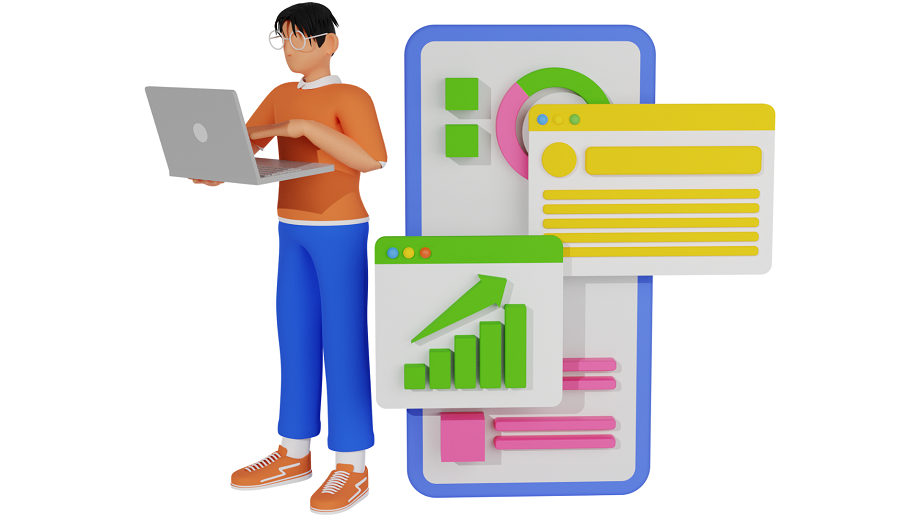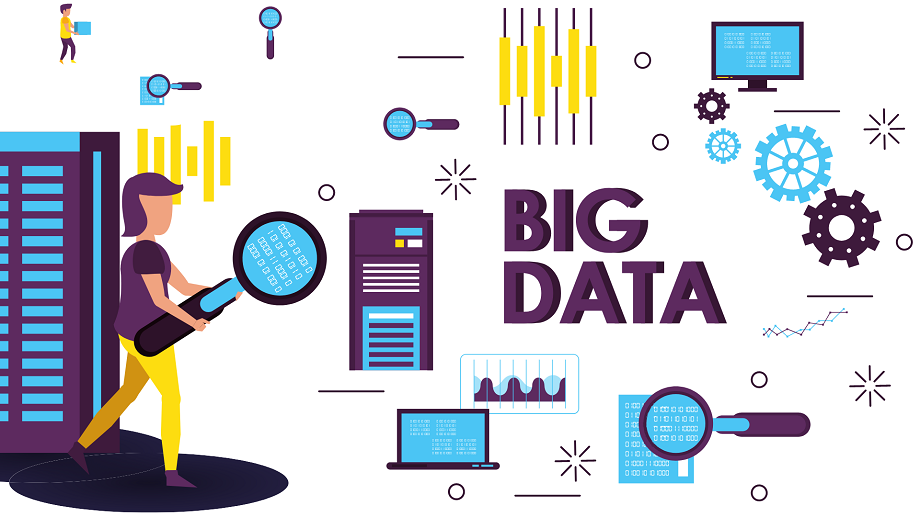
Do you know what Big Data is? If not, don't worry – you're not alone. Big Data is a term that gets thrown around a lot in the business world, but many people are still unsure of what it means.
Big data is one of the most important assets a company can have. It can help them make better decisions, understand their customers, and improve their operations. However, not all companies can make the most of Big Data. In this blog, let's find out how successful companies make the most of their Big Data and how you can do the same for your business!
In recent years, big data has become one of the essential tools for businesses of all sizes. According to a recent study, 87% of companies believe that big data will transform how they do business in the next three years.
And it's no wonder why: with the advent of cheap and powerful data storage and analysis tools, businesses now have access to a nearly limitless supply of information. But simply analyzing data is not enough to guarantee success. Companies must also know how to use that data to their advantage. Here are ten ways how successful companies make the most of their big data:
There is too much information for businesses to rely on intuition and guesswork when understanding their customers. Big data provides the tools necessary to make sense of it all. Successful companies use big data to better understand customers' pain points through analytical techniques; they can understand what their customers want and need.
This, in turn, allows businesses to provide better products and services, which leads to increased sales and happy customers.
They use big data to improve their marketing efforts by gathering insights into customer preferences. This allows them to determine their most effective marketing approaches, and create targeted marketing campaigns that are more likely to result in conversions.
They also use it to improve their products and services. Understanding how their customers are using (or not using) their products can make necessary changes to improve the user experience. For example, if a company sees that its customers are increasingly interested in environmentally-friendly products, it may choose to focus its marketing campaigns on this topic. Or, if a company notices that its customers are spending less time on its website, it may decide to create more engaging content.
Companies use big data to make better decisions by providing more accurate information about what is happening in their industry and the world.
This can help them make better decisions about where to invest their resources and how to respond to changes in the market.
By analyzing data, companies can gain insights into which products are most popular, what features customers are looking for, and how products are being used. These decision making tools help to make the process more visual and easier to process.
This information can make more informed decisions about which products to develop, how to improve existing products, and how to market and sell them.
Companies can identify areas where their service falls short by analyzing behavioral patterns and making the necessary adjustments. They use data to develop more personalized service models, providing customers with the individualized attention they crave. It enables them to analyze information from web visits, social media, call logs, and other sources to improve customer service. In an increasingly competitive marketplace, those companies that make the most of their big data will be the ones that thrive.
Let's take online reputation data as an example. Online reviews are crucial in modern internet society. According to statistics, 85% of consumers believe what they read online. Therefore, establishing trust or distrust in the market might determine your company's success or failure. Successful companies no longer speculate on what customers think about their brand thanks to big data. Companies can access millions of online posts, online activities, and particular mentions through big data analytics to learn what their customers think of their products and services.
Businesses gain insights into their operations and make decisions that improve efficiency and drive growth. However, reaping the benefits of big data requires more than just processing large quantities of information. Successful companies make the most of their big data by using it to streamline their operations.
By analyzing data on everything from customer preferences to production processes, they can identify inefficiencies and areas for improvement. They can optimize their businesses and better meet the needs of their customers. It allows them to identify patterns and trends, make better decisions, and improve their overall performance.
It saves them time and money by automating tasks that would otherwise be manual and time-consuming. It automates processes in industries where every minute counts, especially in fields such as healthcare or logistics. This means that employees have more time to focus on activities crucial for the business's success but are not as time-consuming, such as developing new products.
Businesses identify new opportunities for growth and expansion using big data. They analyze large data sets better to understand their customers, markets, and operations. This knowledge allows them to decide where to invest resources and how to serve customers better.
Big data can be a valuable tool for identifying potential opportunities for businesses looking to expand into new markets. It gives them a better sense of unmet demand and stays one step ahead of the competition.
Companies use it to help identify potential risks and problems before they happen. By analyzing data patterns, businesses can predict where issues are likely to occur and take steps to avoid them. Big data can also monitor compliance with regulations, ensuring that the company meets all legal requirements.
Big data is the future of business efficiency. Big data help businesses predict what will happen in the future. This allows them to predict what will happen with specific customers, products, or services and then plan for those outcomes. Businesses are more efficient because they can anticipate problems before they occur.
For example, if a company knows that there will be a lot of snowfall during the winter months, they can order additional inventory before winter starts, so they don't run out of product. This means no lost sales due to weather delays!
Companies also utilize big data by trying something new but aren't sure if their customers will like it yet. They can use big data analysis to determine whether people would like this new product idea before investing too much time or money into creating it!
Companies that use big data can take advantage of consumer trends, better manage their supply chain, predict customer needs or preferences, identify opportunities for new products or services, improve email marketing strategies and campaigns, and effectively target sales using analytics tools.
Businesses can identify patterns and trends that would otherwise be undetectable by analyzing large data sets. This allows them to gain a competitive edge by making better decisions, improving their operations, and offering superior products and services. In a world where data is becoming ever more important, companies that know how to use it effectively will have a significant advantage over their rivals.

Big data refers to a large data set that can be analyzed to reveal patterns and trends. This data can come from various sources, including social media, website click-throughs, and purchase history. It is a term for data sets that are so large or complex that traditional data processing applications are inadequate. Challenges include capture, storage, analysis, data curation, search, sharing, transfer, visualization, querying, updating, and information privacy. The difficulties of dealing with such data have spawned the field of big data management.
The term "big data" has only been around since the late 1990s, but the concept of understanding large amounts of data for analysis is much older. Some historians believe that the first use of big data came from Ancient Rome. The Roman Empire collected census data to keep track of its citizens and their property. This data was then used to make decisions about infrastructure and taxation.
The first use of big data in the modern world came about in the mid-20th century. At this time, organizations began using large amounts of data to make better business decisions. For example, retailers began using data from surveys to choose which products to stock on their shelves. And, insurance companies started using data from claims to determine which risks to insure against.
In the early 21st century, the use of big data took off. This was thanks to two essential factors: cheaper storage and faster computing power. Cheaper storage meant that organizations could keep more data than ever before. And, faster computing power meant they could analyze this data more quickly and effectively. Today, big data is used in various industries, from retail to healthcare. And, its use is only expected to grow in future years.
As organizations continue to produce more and more data, they'll need to find ways to make sense of it all. But while big data can be a powerful tool, it's important to remember that it's not a silver bullet. Here are a few things to take note of if you want to make the most of big data in your business:
For one, remember that data is only valuable if it's accurate. This seems like a no-brainer, but it's important to remember that data processing is only as good as the quality of the data itself. So make sure you have a system in place to ensure that your data is as clean and accurate as possible.
Second, don't try to boil the ocean. It's tempting to want to analyze all the data you can get your hands on, but this is often not necessary and can even be counterproductive. Trying to analyze too much data can lead to information overload and make finding the signal in the noise challenges. So start with a specific problem or question you want to answer, and then get only the relevant data.
Don't forget the human element. Big data is a powerful tool, but it's important to remember that it's only part of the equation. The real value comes from the insights you glean from analyzing the data, which requires human expertise and interpretation. So make sure you have a team in place that's capable of doing that.
Big data has become a significant buzzword in the business world, and for a good reason. The ability to process and analyze large amounts of data can be precious for businesses of all sizes. If you're a business owner, it's essential to understand how you can make the most of your big data.
In this article, we've discussed a few key ways that successful companies utilize their big data. Understanding your customer base can more effectively target your marketing and sales efforts. Analyzing data can help you to identify areas of your business that may require improvement. And finally, by utilizing data-driven decision-making, you can ensure that your company is continuously operating at its best.

11 Most Underrated Skills That'll Make You a Hot Commodity in the IoT Industry
How Identity as a Service (IDaaS) Can Help Protect Your User's Identities and Sensitive Information

14 posts | 0 followers
FollowAlibaba Cloud Community - September 16, 2022
Nick Patrocky - August 26, 2022
Amuthan Nallathambi - October 12, 2023
Amuthan Nallathambi - June 4, 2023
Alibaba Clouder - October 27, 2020
Lana - April 14, 2023

14 posts | 0 followers
Follow Big Data Consulting for Data Technology Solution
Big Data Consulting for Data Technology Solution
Alibaba Cloud provides big data consulting services to help enterprises leverage advanced data technology.
Learn More Big Data Consulting Services for Retail Solution
Big Data Consulting Services for Retail Solution
Alibaba Cloud experts provide retailers with a lightweight and customized big data consulting service to help you assess your big data maturity and plan your big data journey.
Learn More Quick BI
Quick BI
A new generation of business Intelligence services on the cloud
Learn More ApsaraDB for HBase
ApsaraDB for HBase
ApsaraDB for HBase is a NoSQL database engine that is highly optimized and 100% compatible with the community edition of HBase.
Learn MoreMore Posts by Nick Patrocky